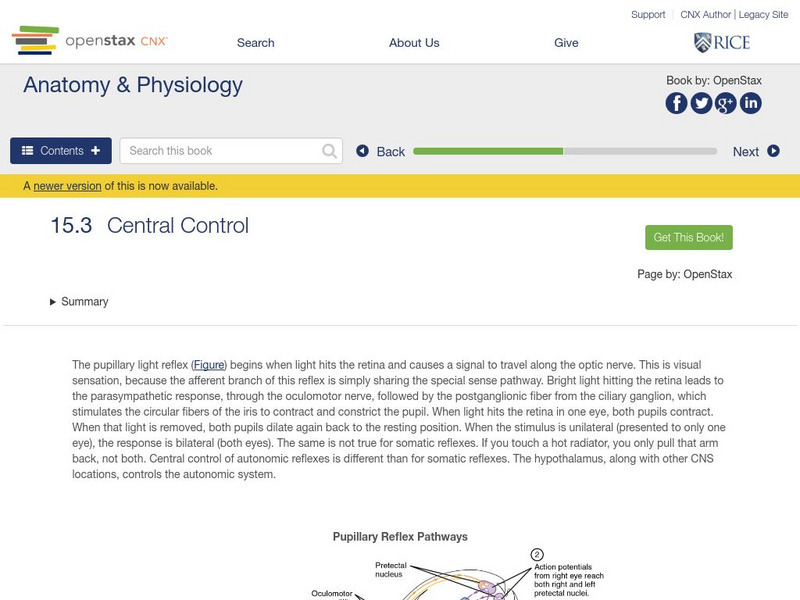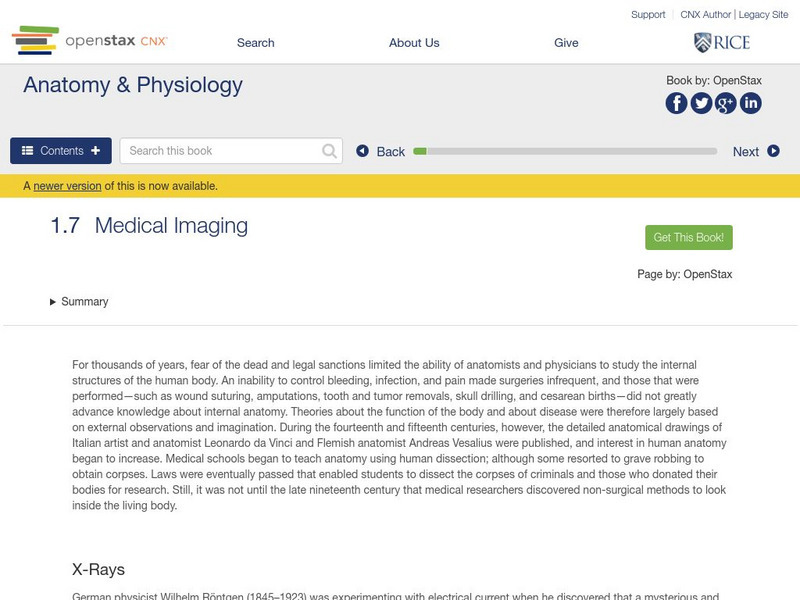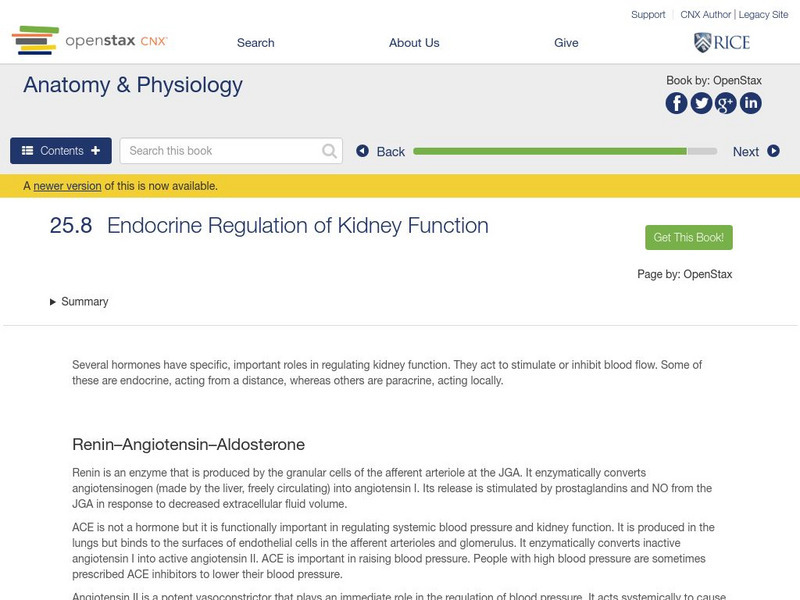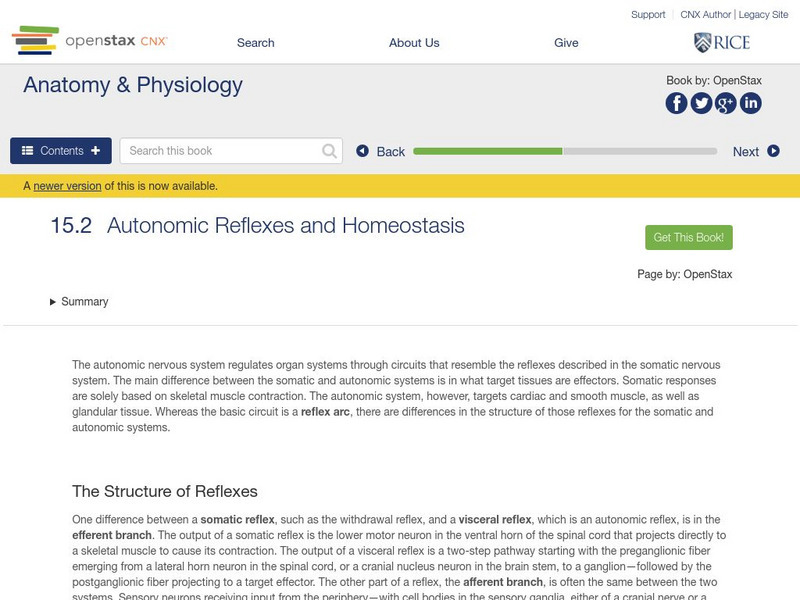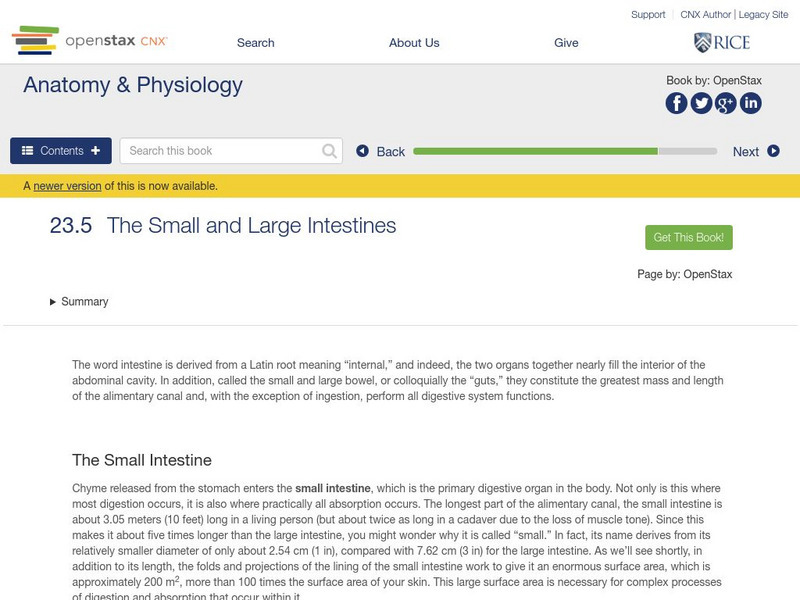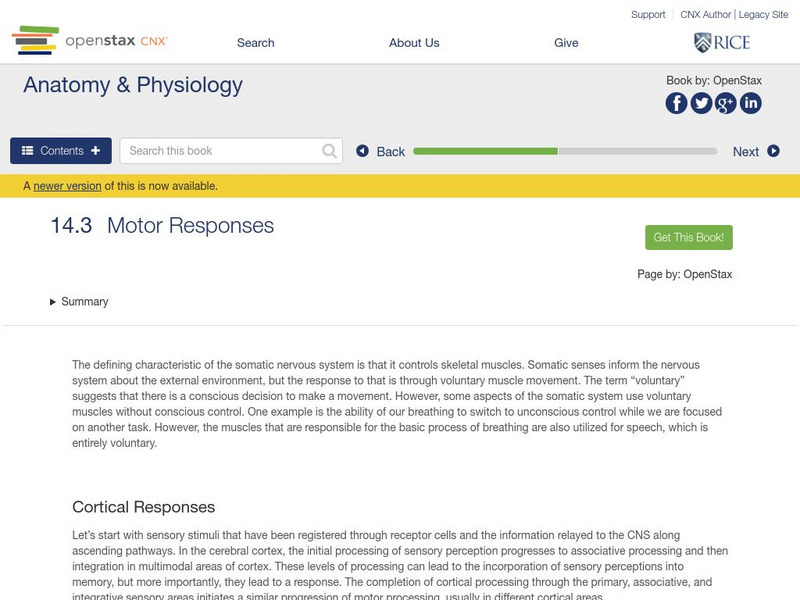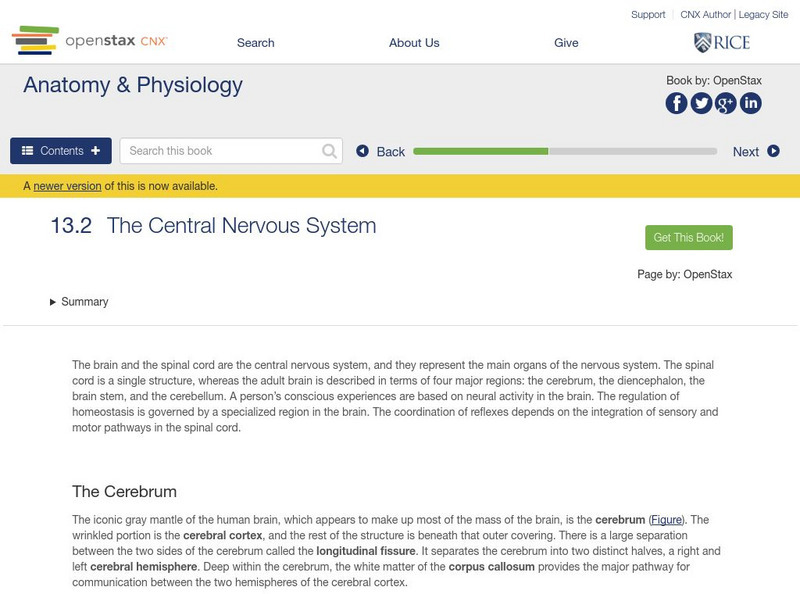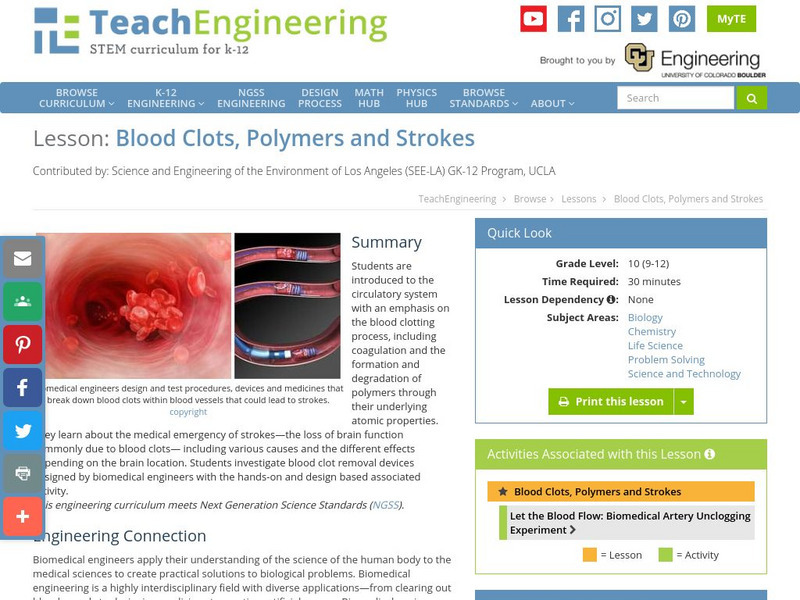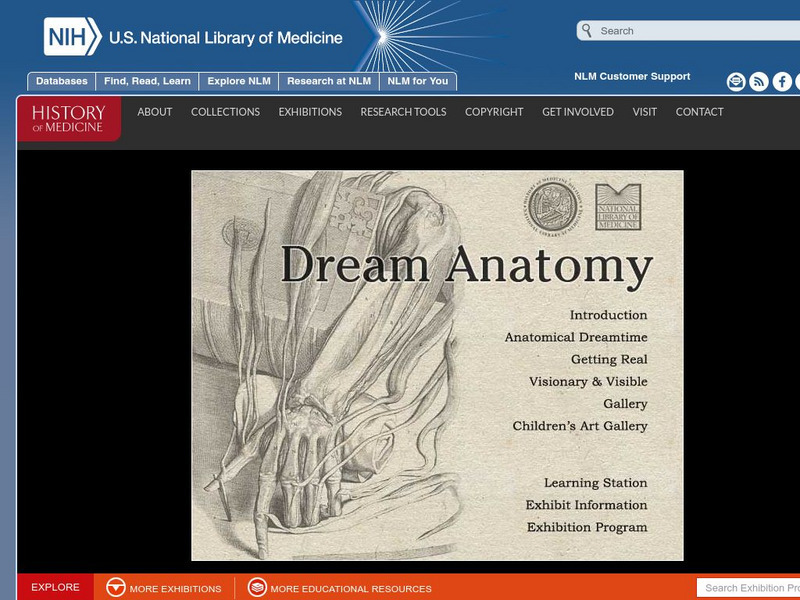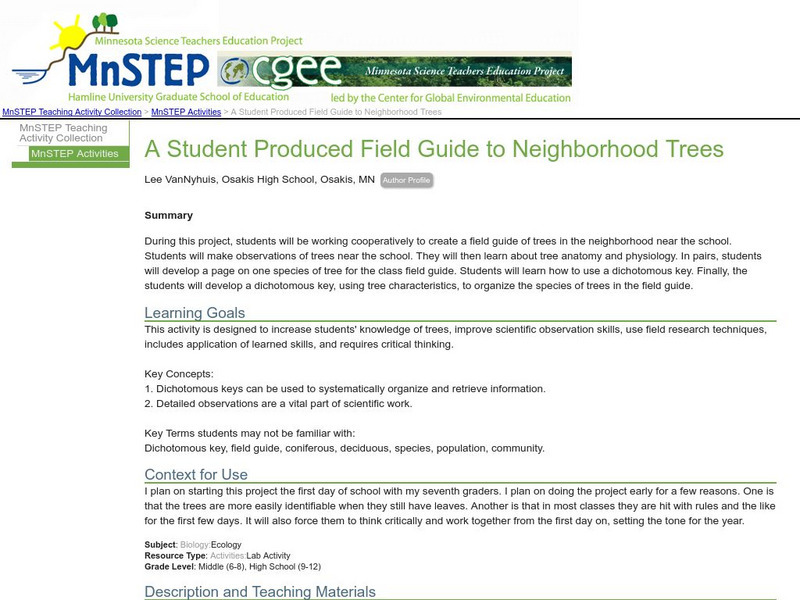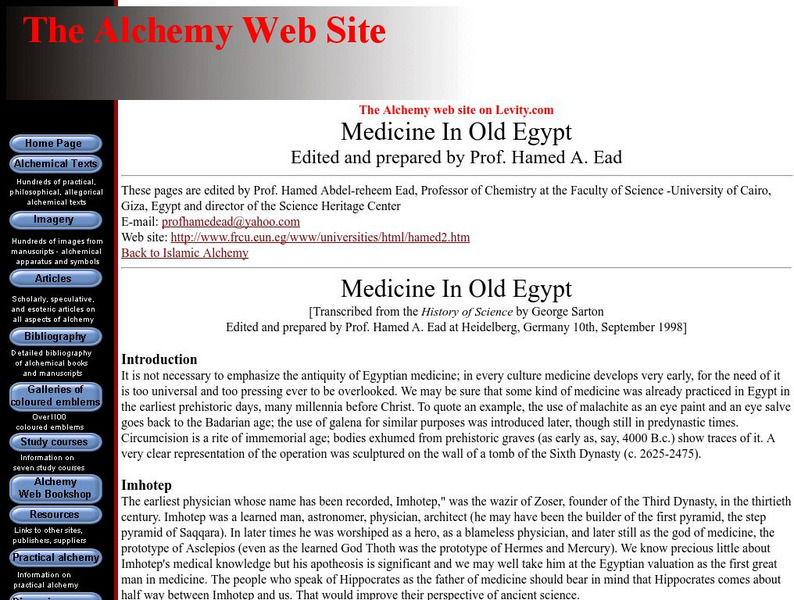Sea World Parks & Entertainment
Sea World: Sharks and Rays
This site provides extensive information about sharks and their relatives. Content includes a focus on a shark's habitat, distribution, physical characteristics, senses, behavior, diet, reproduction, anatomy and physiology,...
OpenStax
Open Stax: Anatomy & Physiology: Central Control
Students investigate the role of higher centers of the brain in autonomic regulation.
OpenStax
Open Stax: Anatomy & Physiology: Embryonic Development
Students learn about the stages of embryonic development that occur before implantation as well as the process of implantation.
OpenStax
Open Stax: Anatomy & Physiology: Gas Exchange
Students learn the steps of the gas exchange process that takes place during human respiration.
OpenStax
Open Stax: Anatomy & Physiology: Nervous System Control of Muscle Tension
The following site provides information regarding the nervous system's control of muscle tension.
OpenStax
Open Stax: Anatomy & Physiology: Medical Imaging
Learn here all about medical imaging, non-surgical methods to look inside the living human body.
OpenStax
Open Stax: Anatomy & Physiology: Endocrine Regulation of Kidney Function
Learn how several hormones have specific, important roles in regulating kidney function. Find out how they act to stimulate or inhibit blood flow.
OpenStax
Open Stax: Anatomy & Physiology: The Mental Status Exam
Students understand the relationship of mental status exam results to cerebral functions in the cerebral cortex.
OpenStax
Open Stax: Anatomy & Physiology: Autonomic Reflexes and Homeostasis
Looks at how to determine the effect of the autonomic nervous system on the regulation of the various organ systems on the basis of the signaling molecules involved.
OpenStax
Open Stax: Anatomy & Physiology: Circulation and the Central Nervous System
Students learn about the vessels that supply the central nervous system with blood.
OpenStax
Open Stax: Anatomy & Physiology: The Small and Large Intestines
With this module, students will be able to identify three main adaptations of the small intestine's wall that increase its absorptive capacity. Students will also trace the pathway of food waste from its point of entry into the large...
OpenStax
Open Stax: Anatomy & Physiology: Motor Responses
Students learn the structure and function of the descending pathways of the motor commands from the cortex to the skeletal muscles.
OpenStax
Open Stax: Anatomy & Physiology: Skeletal System Functions
This site helps you understand the human skeletal system, a body system composed of bones and cartilage that performs critical functions for the human body.
OpenStax
Open Stax: Anatomy & Physiology: The Peripheral Nervous System
Describe the structures found in the peripheral nervous system and the functions of those parts in the human body.
OpenStax
Open Stax: Anatomy & Physiology: Types of Muscle Fibers
Learn here all about muscle fibers, including slow oxidative, fast oxidative and fast glycolytic.
OpenStax
Open Stax: Anatomy & Physiology: The Central Nervous System
Students study the adult brain, and learn the connections between the cerebrum and brain stem through the diencephalon, and from those regions into the spinal cord.
Other
Leffingwell and Associates: Olfaction
Provides a technical discussion of the anatomy and physiology involved in the receptors associated with the sense of smell. Includes pictures and formulas.
TeachEngineering
Teach Engineering: Abdominal Cavity and Laparoscopic Surgery
For students interested in studying biomechanical engineering, especially in the field of surgery, this lesson serves as an anatomy and physiology primer of the abdominopelvic cavity. Students are introduced to the abdominopelvic...
TeachEngineering
Teach Engineering: Blood Clots, Polymers and Strokes
Students are introduced to the circulatory system with an emphasis on the blood clotting process, including coagulation and the formation and degradation of polymers through their underlying atomic properties. They learn about the...
National Institutes of Health
National Library of Medicine: Dream Anatomy
Take a step back in time to see the human body and the field of medicine through the looking glass of history. Experience a different kind of representation of our internal anatomy, and learn about the history of human dissection.
Science Education Resource Center at Carleton College
Serc: A Student Produced Field Guide to Neighborhood Trees
During this project, students will be working cooperatively to create a field guide of trees in the neighborhood near the school. Students will make observations of trees near the school. They will then learn about tree anatomy and...
OpenStax
Open Stax: Anatomy & Physiology: Development and Aging of Endocrine System
Find out about the structure and function of the human edocrine system, and how it develops and changes with age.
Other
Get Body Smart: Muscle Fiber Anatomy & Muscle Contraction Physiology
Brought to you by Get Body Smart, students can learn about muscle fiber anatomy and muscle contraction physiology through this easy-to-access tutorial. Sections include Fiber Location and Composition, Nerve Supply to Muscle Fibers,...
Other
University of Cairo: Medicine in Old Egypt
Details evidence from the Smith papyrus and the Ebers papyrus in order to provide an idea of the knowledge of medicine, anatomy, and physiology of the ancient Egyptians.
Other popular searches
- Heart Anatomy and Physiology
- Anatomy and Physiology Web
- Plant Anatomy and Physiology
- Basic Anatomy and Physiology

